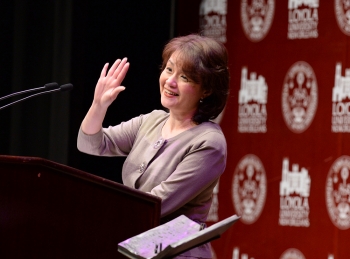
To students, she is forever a role model and mentor. To fellow faculty members, she is a devoted colleague known for her steadfast commitment to Jesuit education. To Loyola University New Orleans, philosophy professor Constance Mui, Ph.D., is the recipient of the university’s top faculty honor—the 2013 Dux Academicus Award. She received the accolade Friday, Jan. 10 at the Spring 2014 Faculty and Staff Convocation.
A proud product of Jesuit education, Mui received her bachelor’s degree at Loyola University Chicago. “It was the Jesuits who introduced her to philosophy; it was the Jesuits who introduced her to the value of ideas, to the importance of critical thinking, and the need to seek truth for the sake of the good,” fellow philosophy professor Mark Gossiaux, Ph.D., said in nominating her for the award.
“Connie … embodies fully the Ignatian values that are definitive of our mission. Her understanding of her vocation in terms of cura personalis and the pursuit of the magis in all she does and her peerless reputation for teaching, scholarship and service make her an ideal candidate for recognition as a Dux Academicus,” said John Sebastian, Ph.D., in recommending Mui for the award.
For former student Marissa Gentner ’13, who spent countless hours working with Mui on her senior philosophy thesis, Mui’s teachings changed her life for the better, encouraging Gentner to “cultivate the Jesuit value of excellence, both academically and personally,” according to Gentner’s nomination letter.
“Dr. Mui’s teaching and class readings … transformed my personal life, for I find that I think much differently about my own life and the world around me,” Gentner said in the nomination. “I cannot, for instance, watch certain television shows, particularly Japanese animated series, without critically analyzing the female characters—most notably their sexualized appearances and their constant subordination to the male characters of the show.”
Mui’s diverse and immense body of work demonstrates the same dedicated and tireless approach she takes with her students. Mui, who holds the Rev. Scott Youree Watson, S.J., Distinguished Professorship in Arts and Sciences at Loyola, is an internationally prominent scholar and expert in the philosophy of Jean-Paul Sartre. Mui spent a month as a visiting scholar in one of the elite universities of China—Fudan University in Shanghai—giving a series of lectures on the history of modern philosophy.
Her work has also been praised by the late Hazel Barnes, Ph.D., the eminent scholar who popularized existentialism in America by translating Sartre’s magnum opus, “Being and Nothingness” (L’Etre et Le Neant) into English. “Her work is a splendid—perhaps exemplary—blend of theoretical and applied philosophy,” Barnes wrote in praise of Mui’s scholarly articles.
Mui is also active in her profession. She served as president of the North American Sartre Society and currently serves as reviews editor for Sartre Studies International. She is also hosting and coordinating the upcoming annual meeting of the Society for Phenomenology and Existential Philosophy set for Oct. 23-25 in New Orleans. The Society for Phenomenology and Existential Philosophy is the second largest philosophical association in North America.
Mui, who was director of the University Honors Program from 2007 until 2010, was also responsible for spearheading the first-ever Jesuit Summer Institute, convened at Loyola in 2009. The summit welcomed 28 students from more than half of the nation's Jesuit schools to New Orleans to explore justice issues, particularly in post-Katrina New Orleans. Those involved returned to their home institutions transformed by the experience and eager to apply the lessons they learned at Loyola.
“The effects of Connie’s commitment to our mission radiate well beyond our own community,” Sebastian said in his nomination letter.
“As impressive as Dr. Mui’s scholarly achievements are, they do not overshadow her contributions as a teacher, adviser and mentor to Loyola’s students,” Gossiaux said in his nomination letter. “The real contribution of Dr. Mui’s teaching is not that she equips students with the skills to make a living (which she surely does), but that she shows her students how to make their lives worth living.”
